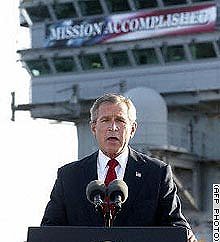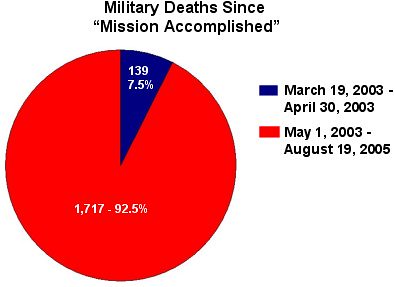Numbers Say Bush Owes Sheehan Explanation
"Major combat operations in Iraq have ended," declared President Bush, in a nationally televised address, backed by a giant banner proclaiming "mission accomplished."
 I'm sure that Cindy Sheehan and many other parents around the country breathed a sigh of relief and hoped that the Bush administration's pre-war claims would come true: That the effort would be quick, decisive and with minimal spilling of American blood – and that Secretary of Defense Donald Rumsfeld knew what he was doing to protect the troops in the occupation that would follow.
I'm sure that Cindy Sheehan and many other parents around the country breathed a sigh of relief and hoped that the Bush administration's pre-war claims would come true: That the effort would be quick, decisive and with minimal spilling of American blood – and that Secretary of Defense Donald Rumsfeld knew what he was doing to protect the troops in the occupation that would follow.Of course, we now know that the president's shipboard posturing was premature at best and, at worst, a device to mislead the American people into believing that the toughest times in Iraq had past.
Aside from the things Bush obviously knew before invading Iraq – that Iraq possessed no weapons of mass destruction and had nothing whatsoever to do with September 11 – he also had a direct warning from Army Chief of Staff, General Eric Shinseki. Shinseki warned Bush and Congress on February 25, 2003 that the U.S. was not preparing adequate forces, with appropriate troop levels, to ensure peace and stability after the initial invasion.
When asked by Senator Carl Levin (D-MI) to estimate the size of an allied occupation force after victory, Shinseki said "Something on the order of several hundred thousand soldiers are probably a figure that would be required."
"We're talking about a post-hostilities control over a piece of geography that's fairly significant, with the kinds of ethnic tensions that could lead to other problems," said Shinseki.
Amazingly, Bush and Rumsfeld have tried to tell Americans that the post-invasion difficulties encountered in Iraq could not have been foreseen – despite having been told precisely what to expect by the highest-ranking Army officer, who was tasked with providing exactly that expertise.
Rumsfeld and Deputy Defense Secretary Paul Wolfowitz moved immediately to discredit Shinseki and to repudiate his assertions on required troop numbers. Wolfowitz said that Shinseki's estimate was "wildly off the mark."
He also said that Shinseki's prediction came at a "delicate time" when the Bush administration was trying to cobble together a broad-based coalition to support an invasion of Iraq and that it was "..not a good time to publish highly suspect numbers."
Finally, Wolfowitz countered Shinseki by saying it was difficult to understand how someone could predict that the occupation would require more troops than the invasion itself.
I guess Shinseki assumed that being a highly-decorated Army officer with almost four decades of service – including extensive combat duty in Vietnam – coupled with the fact that his job was to make those manpower determinations, might make his opinion more worthwhile.
General Shinseki "retired" shortly thereafter, in June 2003, and it is widely speculated that he was forced out for contradicting Bush's take on what would be required by the Army in Iraq. Shinseki has confirmed only that he was indeed forced into retirement, while withholding comment about any specifics.
So what are the families of the brave men and women killed in Iraq to think now? Cindy Sheehan knows what she thinks – and she wants answers.
According to the Defense Department's Operation Iraqi Freedom (OIF) U.S. Casualty Status, America has lost 1,856 military people in Iraq, effective August 19. Of those killed, well over 90 percent -- including 24-year-old Casey Sheehan -- died after the president's announcement that hostilities had effectively ended.

Source: Department of Defense
And, as with most important issues, this White House continues to insist that they don't owe Congress, the American people or grieving mothers any answers for their misleading rationale for war and the ill-advised strategy that has resulted in so many more deaths.
Cindy Sheehan wants to know why young Casey died fighting in a country that never attacked us, had no ties to the people who did and who possessed no ability to harm our people. She wants to know why Bush and Rumsfeld didn't listen to General Eric Shinseki when he warned that our lack of troop numbers would endanger our soldiers on the ground yet more.
And she's continuing to ask why she was led to believe the mission was accomplished, only to have her son, and 1,716 other men and women killed after the Commander-in-Chief grandly flew onto an aircraft carrier and told us the worst was over.
The numbers don't lie, Mr. President. And they say you owe Cindy Sheehan, and the families of every person killed in Iraq, an answer.

















<< Home